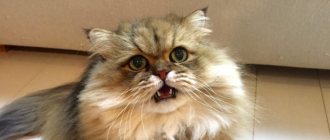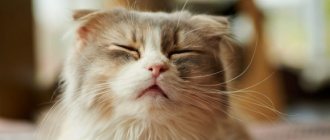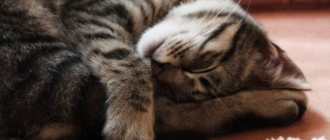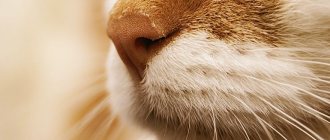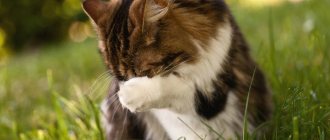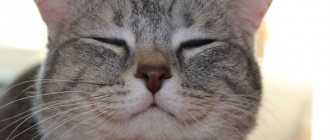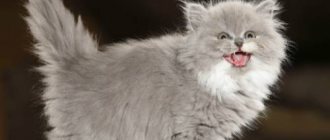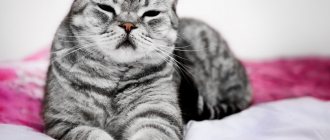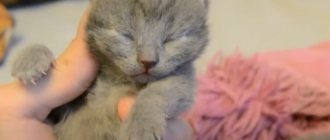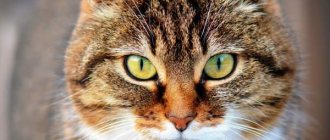A cat's keen sense of smell can cause a lot of trouble, causing it to follow a urine trail into another cat's "territory" or experiment with mysterious food scraps in the trash can. And yet, nothing compares to that unmistakable grimace on your kitty's face with her mouth wide open as she sniffs. You can't help but wonder: Why do cats open their mouths when they smell?
Cats open their mouths when they smell something because of the flechman response. This reaction allows the scent to enter the mouth, where the cat transfers the scent to the vomeronasal organ. Cats use this smell/taste mechanism to explore the appetizing scents or pheromones of other cats.
Rest assured that this grimace on your cat's face is not a sign that your cooking is offensive or that your cat is feeling particularly irritated. Read on to learn why cats open their mouths to explore new environments with their nose (aka smelly muzzle).
What is the Flehmen reaction?
The unusual smelly face your cat makes after sniffing something has a name: the Flehmen reaction. The word "flehmen" is translated in various German languages as "to look evilly" or "to show the upper teeth." Let's see what this strange growl looks like and how it works.
What does Flehmen's reaction look like?
With a notorious reputation for being vicious and completely unpredictable, cat owners believe this unusual feline face is more devious than anything else, using descriptions such as:
- grin
- grimace
- lip arching
- grin of the mouth
- Smirk
The fleaman's reaction is not sinister, and your cat is certainly not plotting anything bad against you. When the flea reaction occurs, the cat arches its upper lip upward, wrinkles its nose, exposes its front teeth, inhales deeply and clicks its tongue.
This goofy expression usually lasts a few seconds (or as long as the strong inhalation lasts), but some cats hold their mouth open a little longer - almost as if they are choking or out of breath.
How does the Flechman reaction work?
It's no accident that your cat's mouth opens when she sniffs near the litter box or in a grassy area in the yard. This Flehman reaction links to (and further enhances) the cat's strong sense of smell. Here's what the process looks like:
Inhalation
A curious kitty will follow her nose until she finds something that catches her attention, be it a seemingly bare spot on the wall or an empty ceramic bowl after dinner. The cat leans over and “inhales” the scent through its nostrils and mouth. At this initial stage, you will notice a noticeable curl of the lips and exposed teeth - a real flemen!
Clicking your tongue
If you look closely, you'll see your cat sniffing, running her tongue up and down—a bizarre sight. This clicking motion transfers odor from the tongue to the vomeronasal organ (Jacobson's organ), located in the roof of the mouth.
Small canals located behind the top row of teeth connect to the brain, allowing the cat to decipher what that strange smell might indicate.
Analysis
Possible reasons
If a cat sits with its mouth open after intense play with long runs and rapid jumps, then there is absolutely nothing to worry about, since the animal is simply hot. There are no sweat glands on the skin of cats, and breathing through an open mouth can be a protective complex reaction of the body. Time will pass, the pet will cool its body by opening its mouth and will begin to breathe again, as befits all representatives of its species.
Stressful situation. Many meowing pets have a hard time traveling by transport, even in a comfortable car, and staying in unfamiliar, foreign places. Stress causes the animal's temperature to rise, its heart rate to increase, and it opens its mouth to cool itself.
We recommend viewing
Why do cats change their sleeping places? Why do cats get in your face while you sleep? Why do cats act strange when you scratch the base of their tail?
Drawing the aroma into the mouth and vomeronasal organ almost doubles the sensory experience. While a cat's taste buds are significantly delayed, its sense of smell can be 14 times more powerful than a human's.
Thanks to the flechman response, a cat can accurately "sense" another cat's pheromones or other mysterious scent by redirecting this sensory response to reliable olfactory receptors.
Are you still a little curious about your cat's mysterious "stinky face" and why cats make it? The Jackson Galaxy video below will help you understand this strange feline behavior a little further:
Why does a cat chew and lick wool sweaters?
Read also: Review of ZTE Blade 20 Smart
This actually happens periodically. Some owners suggest that the cat simply lacks some nutrients that it finds on the surface of the owner's sweater. However, scientists say that most likely the reason for such actions lies in something else. Some cats just have an impulsive urge to chew, suck, or lick things. In most cases, these are woolen items, however, some individuals prefer human hair, shoe laces, cardboard or plastic bags. And if your cat eats a high-quality diet, if she exhibits high energy levels, and if she has a shiny coat and healthy skin, then it is very unlikely that the behavior is due to nutritional deficiencies. However, certain medical conditions, such as diabetes or anemia, can cause this behavior. Therefore, if your cat begins to lick or chew sweaters, it would be a good idea to take her to a veterinarian, who could give an accurate answer to the question about the suspected health problems.
What causes a cat to have a Flechman reaction?
The flea reaction (and the accompanying mouth opening) enhances the cat's sense of smell and its ability to "read" the chemical message. However, cats don't always open their mouths when they smell something. Let's talk about cases when a flea man's reaction can be useful to a cat.
Detection of pheromones and desire to mate
Your cat's scent may not be as distinct or recognizable to you, but all cats leave behind unique scents - sometimes called "pheromones" - during their travels. Cats convey these coded chemical messages when they scrunch up blankets, rub their faces against their owner's legs, or spray their territory. Scent marking is a cat's way of saying, "This is mine... back off!"
The persistent flea reaction is the cat's way of learning about the mysterious kitten who recently made the same journey, but what the cat can learn about the queen through this mechanism is shocking to people. These pheromones can determine whether a female cat is in heat and fertile.
When an uncastrated male cat discovers this mating opportunity, he begins to frantically yelp and scream to attract the female's attention. This is why male cats are much more likely to open their mouths when sniffing than female cats, at least when it comes to detecting pheromones.
Kitten identification
Female cats may not exhibit the flechman response in the same manner as males, but they are no strangers to this unusual and attention-grabbing growl. A queen with a new litter uses this reflex to identify the distinctive scent of each of her kittens. This high-definition scent recognition allows the mother cat to better track her kittens and ensure they do not stray too far from her care.
Environmental Study
Most often, a cat's flea reaction is caused by the study of pheromones and the desire to communicate. However, cats can use these sensory tactics to learn more about any intriguing scent and stay in touch with their environment, for example:
- Leftover food, grease or crumbs
- Cat mint
- bowl of water or food
- New bed, blanket or piece of furniture
- Shoes, toothbrushes or combs (where you leave your scent).
Some cats have a habit of taking these deep breaths even in the absence of pheromones or a new litter. It is nothing more than curiosity, personality and habit.
Why does a cat open its mouth when smelling?
Sometimes you can notice how a cat that is sniffing something opens its mouth. At the same time, you can notice how her muzzle begins to wrinkle, and the cat’s upper lip moves back a little. Here we can only say one thing - the cat draws in air through its nostrils, thus capturing the smell and transmitting it to a special organ located in the upper part of the palate, which has a very intensive blood supply. Odor molecules entering this organ trigger a mechanism that results in sending information about the odor to the brain. Of course, all this happens much faster than described: literally in a tiny fraction of a second. This happens with a variety of odors, but most often with the smell of another cat’s urine. And many cats sniff the genitals of a cat in heat or its urine in exactly the manner described above.
Flehman's reaction to other animal species
Unless you are a zookeeper or regular visitor to a sanctuary, your cat's first reaction to the smell of fleas will likely be quite surprising. However, domestic cats are not the only species that can curl their lips when a certain smell piques their interest. Other species that have this ability are also known:
- Horses
- Buffaloes
- Giraffes
- Hedgehogs
- Pandas
- Tigers
- Rhinoceroses
- Hippos
- Llamas
In the animal world, this flea reaction would not exist if it were not for scent communication. All of the above animal species send chemical messages (pheromone deposits) when they urinate in an open space. This “marking” behavior allows animals to signal that they are ready to mate or claim a certain territory. The emerging flehmen is a way to “read” the signal.
Despite this common reflex and the ability to communicate through smell, scientists have yet to determine whether the flemen response is cross-species. That is, can a cat, for example, dissect and understand the pheromones of a panda (or a tiger and a rhinoceros). Although this skill has no evolutionary purpose, it would be interesting.
Curious sniffers
If you see your pet with his mouth open, sniffing around with a funny "facial expression", don't worry - he's just exploring his surroundings and getting to know his neighbors who have left their scent.
Cats are multifaceted creatures: everyone knows this. These are magnificent hunters, desperate fighters, ardent lovers, caring parents, and affectionate pets. This is not a complete list of cat talents. There are many others, which hardly anyone can list.
However, in addition to quite obvious talents, cats have no less number of oddities, some of which science has at least explained, but no less of which remains mysterious. And just as in the case of cat talents, few would dare to list all the cat’s oddities, all the inexplicable or poorly explained details of its behavior. We will look at some of them in this article.
How to add the talking mouth effect to your favorites
Finding an effect for the first time takes a lot of time. If you plan to use it more than once, it is recommended to add it to the “Favorites” section. This is done so that you can always have a mask on hand when an interesting idea for use arises.
Through the “Trending” tab
The most common, but time-consuming method. To use the option, you need to do a couple of minutes of searching. The method is as follows:
- Open the application. On the main page at the bottom, click “+” to open the video recording window;
- At the bottom left, click on “Effects”, go to the “Trending” section;
- In the list of masks and effects that opens, find one of the “Talking Mouths” you like. The search may take some time, but can be made easier by browsing through other categories, such as Cats;
- After selecting the desired mask (or all three), click on the bookmark image on the left above the window to select masks;
- After clicking, the transparent icon will turn white - this means that the mask is saved in a separate tab.
After clicking on “Add to Favorites”, the mask will be in the “Favorites” section. The section is marked with a check mark. In addition to the “talking mouth”, other effects saved by the user as bookmarks will be shown there.
Why are cats attracted to specific smells?
Attentive owners of furry pets may have noticed that cats show special interest in smells that are unusual, in human opinion. For example, cats love the smell of dirty clothes, unwashed socks or sweaty armpits. Thus, some kittens and adult pets like to sleep on unwashed linen, put their muzzles in shoes or enjoy “poking” into the armpits, while preferring more male ones. What causes this behavior, why do cats lick their armpits?
First of all, don’t be scared and think that your pet has gone crazy. The thing is that representatives of the cat family have a much better developed sense of smell than humans. Cats can detect odors and aromas that are not sensitive to our noses and at the same time feel them much more strongly.
Through new scents, cats navigate in space and adapt to environmental conditions.
Smells can attract or, conversely, repel cats. For example, cats simply adore human sweat. Animals like the smell of their owner's clothes and shoes. It is worth noting that such “scents” attract more adult cats than kittens. Babies show less interest in strong aromas and use their owner's clothes or socks as new toys.
